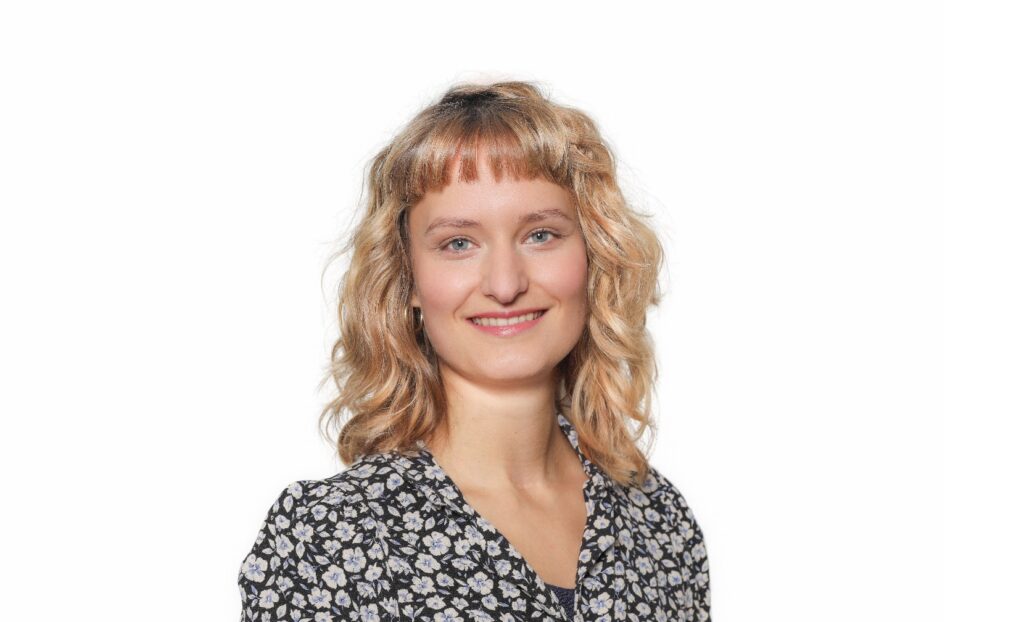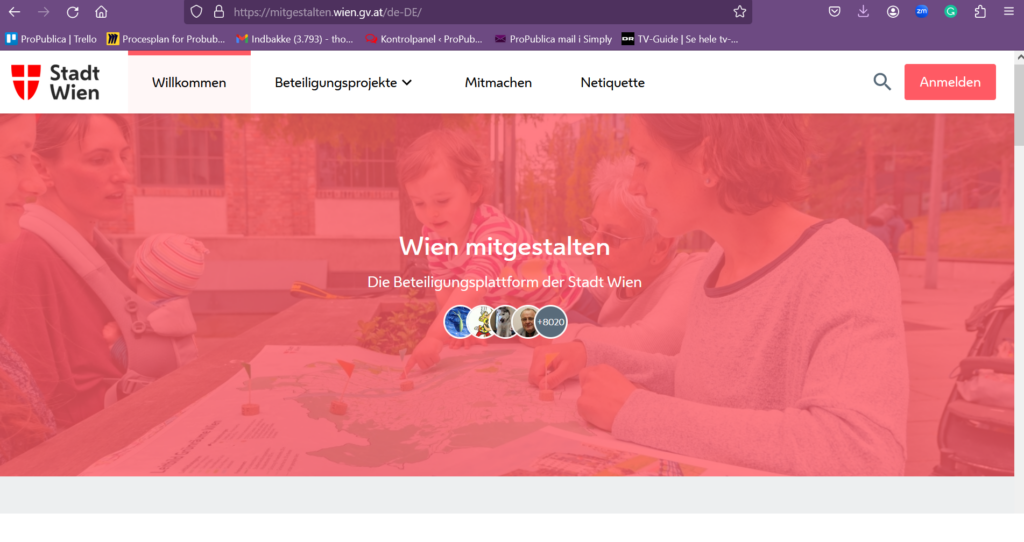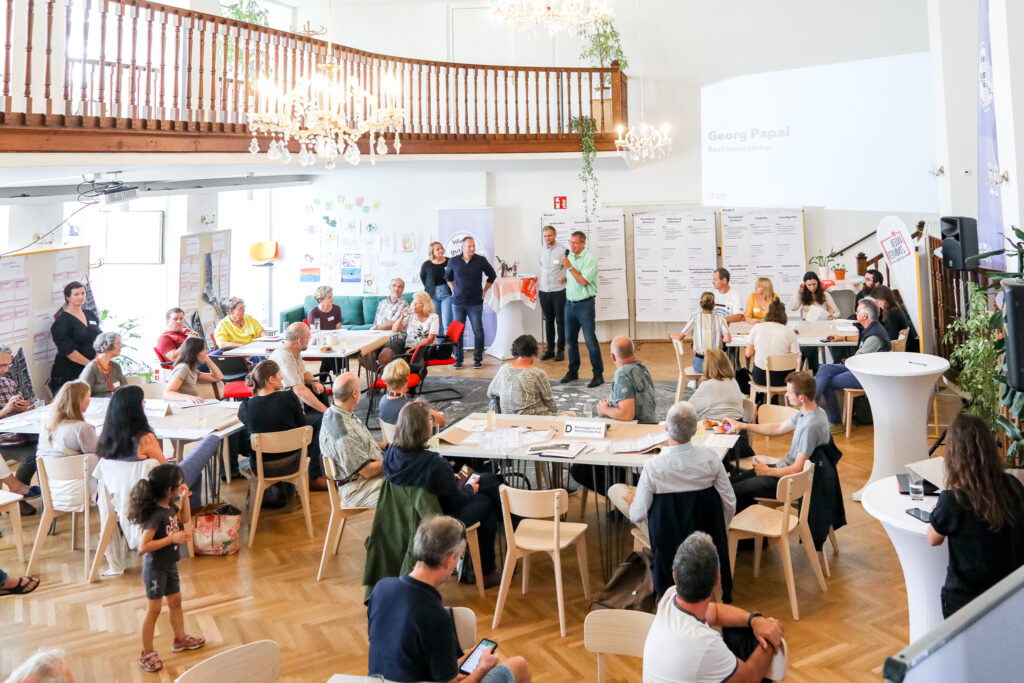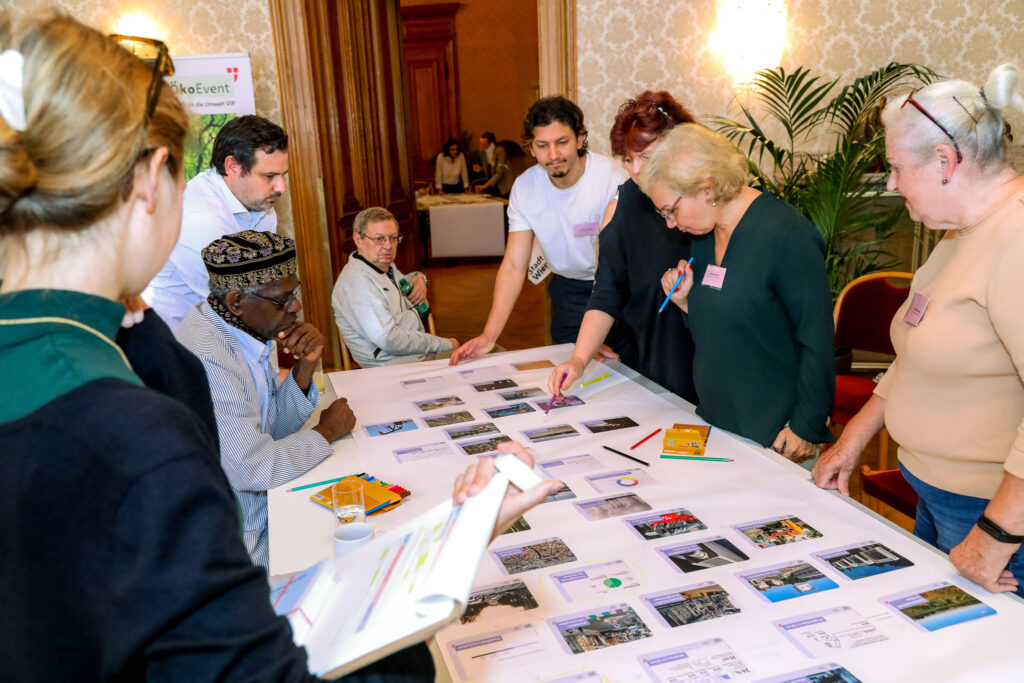In the Austrian capital, they're experimenting with citizen-driven green transition projects and new ways of practicing democracy. The city council's communication plays a significant role. Meet Katharina Toth from Vienna Climate Team.

18 January 2024
There is a traffic hub in Vienna called Bahnhof Ottakring. It's fair to say that it's the place you don't hang around too much. As Katharina Toth from Vienna Climate Team puts it:
- It's quite ugly.
Thousands of people pass through every day. Imagine a relatively large space consisting of 1.600 square meters of grey concrete, suffocatingly hot during summertime, not very adapt to the more frequent heat waves and heavy showers that climate changes imply. That's it.
But not for very much longer.
More than a thousand proposals
In a pilot project initiated for 2022/2023, the city council of Vienna has put the Austrian capital's citizens and their ideas in front of a green transformation of the city. The city council of Vienna Climate Team facilitated citizens to present ideas and decide which climate project drafts should be carried out in the city districts with a pre-defined budget of around 20 euros per citizen.
More than a thousand ideas and proposals came up in each pilot year.
This may not be hard evidence of a functioning and vibrant local democracy. But it could be an indicator.
In the Viennese experiment, for a citizen-generated idea to become reality, it must pass through a series of phases involving a revision process of experts of the City of Vienna, co-creation workshops with citizens and experts as well as the selection of a project draft by a representatively selected citizens’ jury. Long story short, as a consequence, the area around Bahnhof Ottakring will soon be greener, and that will be a consequence of a citizen driven initative.
-More trees, more climate adaptation measures, an infrastructure where people can make events […]. To make the square more attractive, the streets are to be greened, the quality of stay improved, parking spaces reduced, trees planted and so on, as Katharina Toth describes the “Main square Ottakring” project.

Outreach: Working with local multipliers
One of the critical elements of the whole project has been to make the locals aware of it. To that end, Vienna's climate team have used a wide range of communication channels.
- We are working with local multipliers, organizations that hand over the information to their members. That's a big help. It can be organizations for migrants or religious communities, for example, Katharina Toth explains.
Katharina and her colleagues have also used the city's social media platforms and newsletters, posters, and one-on-one communication with people at various events in the city.
"Wien mitgestalten"
The online citizen participation platform used by Vienna's city council is another example of the city's communicative initiatives. It is not unlikely that the platform's content design and user experience make a significant communicative difference. Vienna's online participation platform, ’Wien mitgestalten’,is developed by the Belgian tech company CitizenLab, but there are others on the market.
The citizens' ideas on the online platform are pretty easily visible, and the simple and functional design makes it look welcoming.

The platform provides the local government with a digital infrastructure they can use to systematize and display the idea generation of the citizens. For the project Vienna Climate Team, at the platform's front end, citizens can follow their ideas and those of their fellow citizens in the progression of the five phases, where experts and citizen juries contribute to developing and selecting the proposals.
The selection criteria for the ideas are clear and easily accessible, and you can find examples of other climate mitigation and green transition projects and inspiration if you need it.
With around 8.000 registered users out of a total population in Vienna of 2 million inhabitants, the platform isn't exactly used by everyone in Vienna. Still, it is an exciting example of how citizen participation and local democratic engagement can be promoted by government communication.
It is also possible to propose climate mitigation projects offline.
The selection process
For an idea to become a reality, it must pass five phases within the Vienna Climate Team project.
First of all, it must emerge. In the first phase, every resident in Vienna can send in their ideas based on the previously mentioned criteria. In the second phase, the ideas are checked by experts from the City of Vienna.

In the third phase, the citizens behind the ideas work with the city's experts in project workshops to develop the ideas and maximize their impact. In the fourth phase, a representatively selected group of citizens from each participating district decide which project drafts will be implemented within the budget limit. And then, in the end, the project drafts that slip through the eye of the needle are implemented within the next two years.
In the district Ottakring, 471 ideas were transformed into 38 project drafts. Out of these 38 project drafts, a representatively selected citizen jury pointed out three project drafts to turn into reality.

Using Climate Fresk to support an informed debate
Be it climate change, elderly policy, or the war in Ukraine; the more you think something is important, the more you will be willing to do something about it. And, of course, you need to know about climate change to think it's important. That way, access to reliable information is a prerequisite for a democratic society.
So, how does the city council of Vienna work to ensure that the proposals from the citizens are based on reliable information?
- The citizen jury has a preparation day where all the jury members of all the districts involved come together. On top of that, there's a jury weekend, Katharina Toth explains.
On the preparation day, the jury members play an adapted version of the collaborative climate change workshop game Climate Fresk, a recently developed French concept based on data and statistics from IPCC reports. It has received global media attention and has been used by more than a million participants in more than 130 countries, according to their website.
- In five rounds of the game, the jury members gradually discover 37 cards and put them together in a logical sequence of cause and effect of climate change. We have adapted the content of the game to the situation in Vienna based on the climate road map of Vienna, Katharina Toth says.
In 2023, the juries recommended 34 project drafts for implementation. These were presented at a festive closing event. It was also announced that the Vienna Climate Team will continue from late summer 2024.
Read more:
- Do you want to learn more about citizen participation and new democratic institutions? Then check out this OECD report from 2020 with good practice principles for deliberative processes, based on empirical evidence gathered by the OECD in collaboration with leading practitioners from government, civil society, and academics.
- Fewer than one-third of the respondents in a 2021 OECD survey covering 22 OECD countries feel the political system in their country allows them to have a say in government decision-making. Read in the OECD report Building Trust to Reinforce Democracy
- • From 1979 to 2023, at least 80 622 citizens have been randomly selected to participate in a deliberative process. Read more in the 2023 Trends in Deliberative Democracy: OECD Database Update